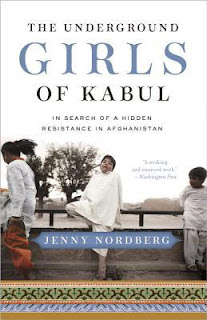
I had wanted to read this book for a while, and I am so glad
I finally did. “The Underground Girls of Kabul” is so much more than what I expected
– maybe I didn’t even know what to expect. Two of my biggest impressions,
overall are 1) this is excellent journalism, and very nice and refreshing to
read something so unbiased, yet personal at the same time, and 2) this is a really
interesting, mind-opening story.
The author, Jenny Nordberg, brings us into the lives of several Afghani women and girls – who grew up at least in part as males. That is, families with only daughters – when producing sons is the sole goal expected of Afghani wives – often allow a daughter to dress, undercover, as a boy. These children are known as bacha posh, the decided upon term that remains applicable to any woman who was raised this way. If necessity is the mother of invention, this is one solution many families turn to. This is not only in Afghanistan: in any conservative society that restricts the rights a minority group – including women, half the population – people will try to find a way to live with more freedom and less fear.
The book incorporates the history of Afghanistan in a way that explains how it is now. I find it hard to summarize, but the author does an outstanding job getting into every angle, contemporary and historical. Where the “West” has intervened in trying to promote “womens’ rights”, this has only done the opposite, where anything that foreigners endorse is viewed negatively. This is not to say that there is an inherent evil in Afghanistan’s culture, nor is Islam to blame – the roots of Zoroastrianism, for example, are deep as well. War, illiteracy, and poverty also perpetuate the inequalities, and the way women are treated. There is a distinction between what is legal and what is practiced. Many of the actual laws are not as prohibitive as we in the west might suppose. The true constrictions come from one's family, peers, and “society” – an often poorly defined word that the author reports on in focus.
This is a comprehensive book on a topic that not even “experts” were aware of before Nordberg began her investigations. Translated phrases, including bacha posh, reveal that such practices have existed long enough to be named. There are many similarities among the disguised, but they are all of course unique. Some make the transition and reversion more easily than others, though the biggest factor is when they make this transition. All of life's biggest challenges are thus experienced in a way different from the other women they know, and they have no one else to compare themselves with. Even the body’s physical development can be affected by the mental training of switching gender. One of the ‘characters’ is an adult who retained her identity in between male and female, and is trying to encourage and empower the youth that are faced with the same situation she grew up with.
By following real people, like Azita, a member of parliament
and mother of four daughters, one a bacha
posh, and Zahra, a teenager determined not to grow up as an Afghan woman, this
phenomenon is made personal. Sympathetic yet objective, the author is in the
story, but it’s not all about her. This is a thesis from as close to the
Afghani perspective as an outsider can present. That alone makes this an
enjoyable read. I highly recommend anyone, especially those concerned with
womens’ rights in Afghanistan or anywhere, to read this excellent book and to learn more about the way other people live.
Note: I received a free physical copy of this title through BloggingForBooks in exchange for an honest review.





No comments:
Post a Comment